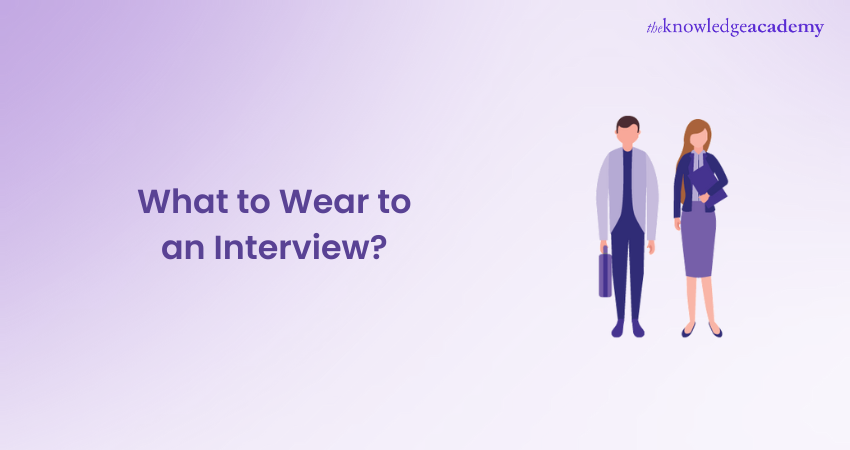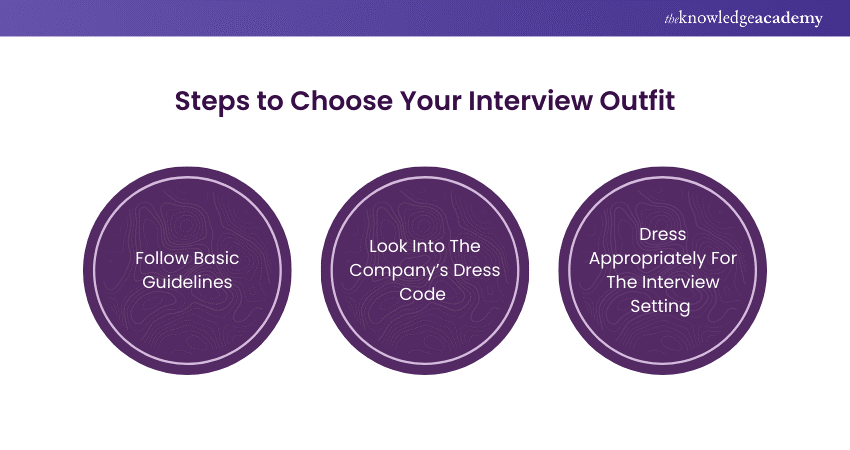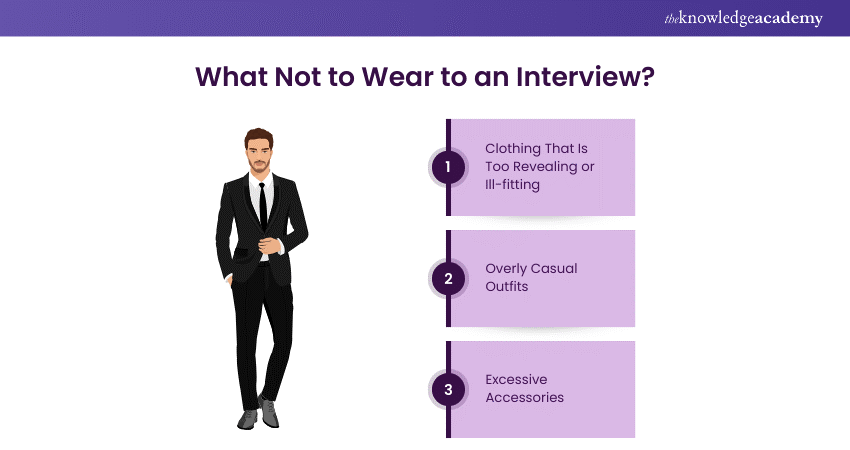We may not have the course you’re looking for. If you enquire or give us a call on 01344203999 and speak to our training experts, we may still be able to help with your training requirements.
We ensure quality, budget-alignment, and timely delivery by our expert instructors.

First impressions count, and knowing What to Wear to an Interview can significantly impact how potential employers perceive you. Your outfit isn't just about looking good; it's about showing professionalism, attention to detail, and an understanding of the company’s culture. But with so many different dress codes out there, picking the right attire can be a bit of a puzzle. Should you go for formal business attire, business casual, or something more relaxed?
Don't worry, we've got you covered! This blog will help you navigate these choices with ease. We'll break down company dress codes and give you tips on how to tailor your outfit to the specific role you're applying for. With our practical advice, you'll look polished and professional, ready to make a lasting impression in any interview scenario.
Table of Contents
1) What to Wear to An Interview?
2) Why Dressing Professionally for an Interview is Important?
3) Steps to Choose Your Interview Outfit
4) What Not to Wear to an Interview?
5) Interview Outfit Ideas
6) What is Good Attire for an Interview?
7) What Should You Avoid in a Job Interview?
8) What Are the 3 Worst Mistakes You Could Make in an Interview?
9) Conclusion
What to Wear to An Interview?
The first thing you must remember before deciding on your outfit is that the interview is meant to test your professional capabilities. However, it doesn't mean to dress in anything that comes your way. When you enter the interview room, the interviewer will first notice your dress. Therefore, you must be cautious enough to make the best possible use of this moment.
Therefore, you must dress according to the interview occasion. For instance, if it's a Zoom interview, you can opt for a formal shirt that will be visible face-to-face with a colour different from the background.
For personal interviews, it's important to take into account the company type. If it's a design-based company, you can go a bit casual. In contrast, for IT companies, you must dress in complete formal attire. For a medical professional interview, you might opt for the lab coat, while, for field-related work, such as mechanical engineers, you can wear a well-fitted suit and tie
Why Dressing Professionally for an Interview is Important
Dressing professionally is the first step toward cracking any Interview Type. Here is the importance of professional-dressed candidates given alongside:
1) Leaves a Positive Impression
The quote "first impression is always the last impression" holds true even today. When you enter the interviewer's room, your overall appearance will be the first thing they will notice.
2) Reflects Your Seriousness About the Role
Dressing appropriately denotes your willingness and seriousness about the role. For many candidates, the interview call is like any other interview from a company. You may have a lot of interviews to cover, but wearing a dress tailored to the organisational type and structure will show how concerned you are about the particular role.
3) Boosts Self-confidence
Wearing professional attire builds your confidence, which is crucial for answering interview questions with assurance. This self-confidence helps you respond effectively and brings you one step closer to acing the interview.
Boost problem-solving with focused listening – join our Active Listening Training today!
How to Dress for an Interview: Steps to Choose Your Outfit
Choosing the appropriate attire for your interview depends widely on various factors, such as company type, working structure, and organisational policies. Listed below are the systematic approaches you can follow to adhere to these considerations.

1) Follow Basic Guidelines
Dress what you are most comfortable with. Rather than wearing too tight or too loose formal wear, making you uncomfortable and preventing you from fully presenting yourself.
Also, make sure the dress you are choosing to be clean and free of wrinkles and tears. Plan a few days prior so you don't need to rush on the last day. You don't need to purchase a new dress completely if you already have one.
2) Look Into the Company’s Dress Code
Research the company's dress code well. A few interview invitations have already been sent to highlight what you need to wear. If not, email them directly and politely ask if there's any particular dress code for the interview. Visit their social media channels and find the patterns of the dresses their employees are wearing. You can even visit their official website gallery and check if they wear any typical dress that is common across most of the photos.
3) Dress Appropriately for the Interview Setting
It's important to follow some ethical norms, like preferring a formal suit (for men) or skirt (for women) over a casual shirt, opting for a solid-coloured shirt, wearing non-jeans pants, and preferring ties for managerial positions. Lastly, pay attention to minute details, such as your well-groomed haircut, beard, and positive body language.
What Not to Wear to an Interview
While it's important to dress decently for the occasion, it's also crucial to avoid certain dresses, attire, and accessories. Let's understand the don'ts in the below sections.

1) Clothing That Is Too Revealing or Ill-fitting
You must avoid wearing too revealing clothes, such as flashy party-type colours, radically multi-coloured dresses, and overly loose pants, such as cargo pants or track pants. Ensure the dress you wear is tucked tightly into your pants, the sleeve buttoned tightly, the neutral-coloured leather belt and the shoes complement your pant colour.
2) Overly Casual Outfits
Avoid flip-flops or athletic shoes during your interview. When purchasing a new outfit, make sure the shirt is tailored fitting and has neutral colours, such as black, white, grey, cream, or beige. Also, you must avoid T-shirts unless it's the design or creative agency. Instead, you can wear the polo T-shirt in a solid and neutral tone.
3) Excessive Accessories
Finally, it's important to avoid too-revealing accessories, like your multi-colour sleeve band, overly sized metal chains and belt strap, or face piercings like septum, cheek, and eyebrow piercings. Moreover, it's important to avoid too strong perfumes as this can be a big turn off for the interviewer. For Sikh candidates, a small dagger in your pocket is generally allowed at the company's discretion.
Build resilience against challenging interactions with our Dealing With Difficult People Course- join now!
Interview Outfit Ideas
It's not always necessary to opt for overly formal dress for the occasion. Even business casual options would complement your overall look as a candidate. Here are some business casual options you can consider for your personal interview.
Business Casual Clothes to Wear to an Interview: For Men
Many organisations have set their dress code by default. Typically, you can wear a light-coloured shirt with long sleeves and a solid-coloured tie. In winter, you can add a sweaters over the shirt. Considering the bottom wear, you can opt for black, brown, or navy-blue pressed cotton pants.
Business Casual Clothes to Wear to an Interview: For Women
For women candidates, it's important to be comfortable and professional. You can wear a comfy top or shirt paired with a cardigan. However, make sure to keep it simple with solid neutral colours and patterns. For footwear, you can wear low heels, flats, or pumps. Talking about jewellery, wear simple earrings and necklaces with light or muted-coloured nail polish.
Transform distractions into productive outcomes with our Attention Management Training- sign up today!
What is Good Attire for an Interview?
Suitable interview attire aligns with the company’s culture. A tailored suit with a neutral shirt is ideal for formal industries—business casual suits less formal roles, like slacks and a button-down or blouse. Always guarantee your clothes are clean, well-fitted, and professional, avoiding overly bold patterns or accessories.
What Should You Avoid in a Job Interview?
Avoid wearing casual or overly flashy outfits, as they can appear unprofessional. Steer clear of strong perfumes, heavy makeup, or distracting accessories. Avoid negativity, such as speaking poorly about past employers, and don’t arrive late or unprepared. Conviction, professionalism, and a positive attitude are key.
What Are the Three Biggest Mistakes You Can Make in an Interview?
The three worst mistakes one can make in an interview are:
1) Being unprepared, such as not researching the company or role.
2) Showing poor communication skills, like rambling or failing to answer questions directly.
3) Dressing inappropriately can signal a lack of professionalism or awareness of the company culture.
Conclusion
Understanding What to Wear to an Interview is crucial in creating a strong first impression. Dressing appropriately reflects your professionalism and respect for the opportunity and the company’s culture. Whether formal, business casual, or creative, your attire should make you feel confident and prepared. Choosing the right outfit sets the stage for a successful interview and leaves a lasting, positive impression.
Enhance negotiation techniques for difficult dialogues- register for our Managing Difficult Conversations Course today!
Frequently Asked Questions
What are the Five do's and don'ts for a Job Interview?

Do's: Be punctual, research the company, dress professionally, prepare answers, and maintain eye contact.
Don'ts: Arrive late, dress inappropriately, badmouth past employers, interrupt the interviewer, or appear unprepared.
What are the Three Rules of an Interview?

The three rules of an Interview are:
1) Be prepared—research the company and role.
2) Communicate clearly and confidently.
3) Dress appropriately to reflect professionalism and company culture.
What are the Other Resources and Offers Provided by The Knowledge Academy?

The Knowledge Academy takes global learning to new heights, offering over 3,000 online courses across 490+ locations in 190+ countries. This expansive reach ensures accessibility and convenience for learners worldwide.
Alongside our diverse Online Course Catalogue, encompassing 19 major categories, we go the extra mile by providing a plethora of free educational Online Resources like News updates, Blogs, videos, webinars, and interview questions. Tailoring learning experiences further, professionals can maximise value with customisable Course Bundles of TKA.
What is The Knowledge Pass, and How Does it Work?

The Knowledge Academy’s Knowledge Pass, a prepaid voucher, adds another layer of flexibility, allowing course bookings over a 12-month period. Join us on a journey where education knows no bounds.
What are Related Courses and Blogs Provided by The Knowledge Academy?

The Knowledge Academy offers various Personal Development Courses, including Interview Skills Training, Active Listening Training, and Managing Difficult Conversations Training. These courses cater to different skill levels, providing comprehensive insights into the How to Answer Interview Questions Confidently: 7 Powerful Tips.
Our Business Skills Blogs cover a range of topics related to professional development, offering valuable resources, best practices, and industry insights. Whether you are a beginner or looking to advance your business skills, The Knowledge Academy's diverse courses and informative blogs have got you covered.
Upcoming Business Skills Resources Batches & Dates
Date
 Interview Skills Training
Interview Skills Training
Fri 16th May 2025
Fri 18th Jul 2025
Fri 19th Sep 2025
Fri 21st Nov 2025






 Top Rated Course
Top Rated Course



 If you wish to make any changes to your course, please
If you wish to make any changes to your course, please


